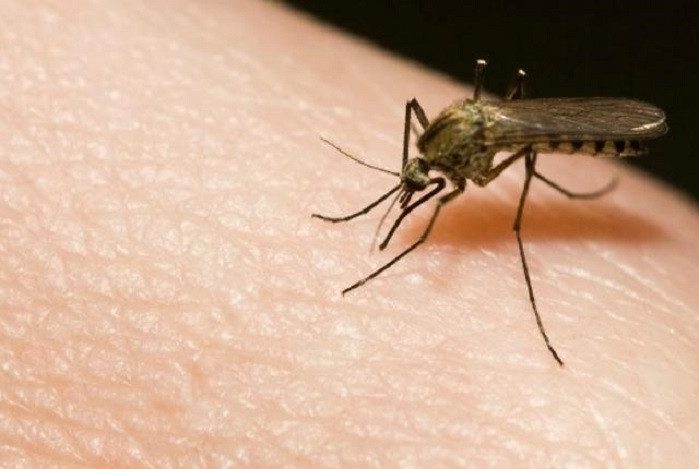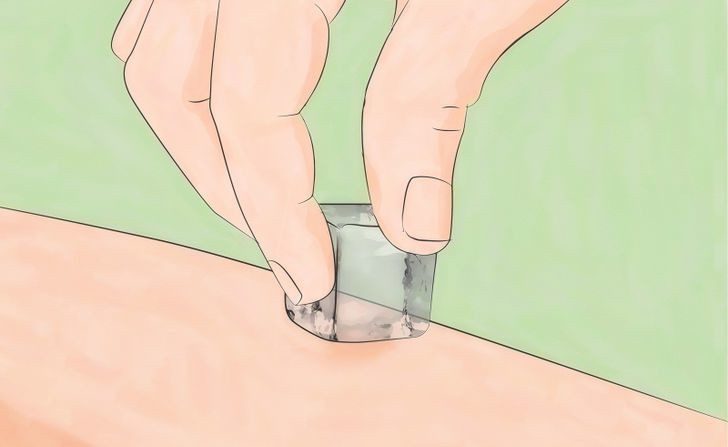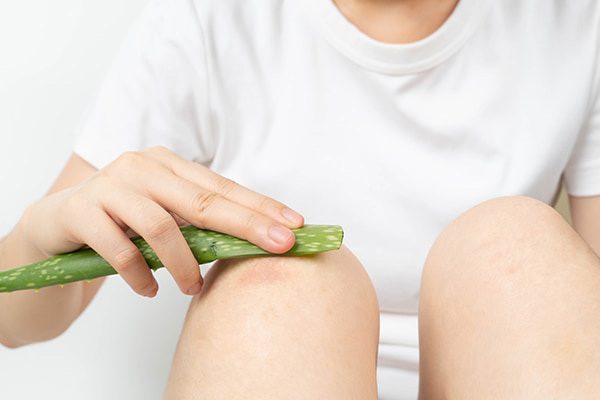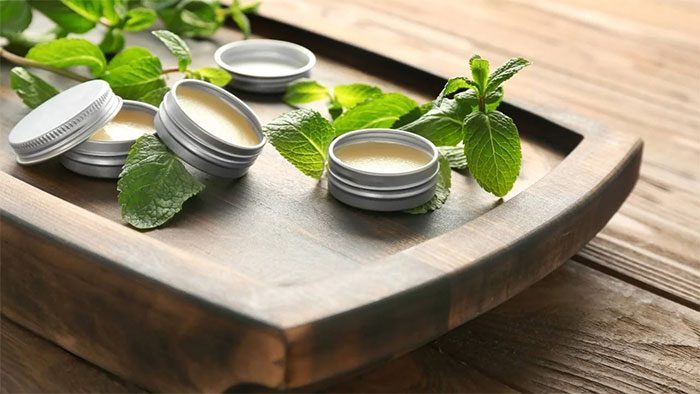The itching from mosquito bites can be extremely uncomfortable, and if you continue to scratch, the bite may become scratched and increase the risk of infection.
Top 11 Quick Relief Methods for Mosquito Bites
Unless you have excellent self-control and can resist the urge to scratch mosquito bites, the simplest and most effective way to combat itching in this case is to use an antihistamine or a cold compress.
When a female mosquito bites you (they require human blood to nourish their eggs, which is why male mosquitoes do not bite), it injects saliva beneath your skin. This saliva contains anticoagulants that help the mosquito draw your blood more easily.

When a female mosquito bites you, it injects saliva beneath your skin.
A study published in 2012 in the journal PLOS ONE revealed what happens when a mosquito bites an anesthetized mouse under a microscope. You can see the brown proboscis of the mosquito probing the pink blood vessel, piercing through it, and beginning to suck. The blood vessel gradually shrinks as the insect starts drinking the victim’s blood:
According to the American Academy of Allergy, Asthma, and Immunology, mosquito saliva activates your immune system to release histamines at the site of the bite, leading to an inflammatory reaction that causes redness and swelling in the area. At this point, your natural reaction may be to scratch uncontrollably. However, this action can scratch the skin, allowing bacteria to enter and cause infection.
The U.S. Food and Drug Administration (FDA) recommends that before the itching becomes unbearable, you should apply an antihistamine cream or gel to the mosquito bite or take an antihistamine tablet.
Look for products containing “Diphenhydramine” in their ingredient list. Both creams, gels, and tablets are widely available at pharmacies at relatively low prices.

A cold compress rubbed on the mosquito bite can help relieve itching.
Research also shows that cold can reduce the itching sensation triggered by histamines. Therefore, rubbing a cold compress on the mosquito bite can help soothe the itch in case you do not have antihistamines available.
With all the diseases you may risk from mosquitoes, including Zika virus and dengue fever, the ideal choice is, of course, to avoid getting bitten by mosquitoes in the first place.
Additionally, you can try the following methods to soothe mosquito bites:
1. Warm Compress
In addition to reducing itching from mosquito bites with ice, you can also apply a warm, clean cloth to the bite for a maximum of 10 minutes at a time. Note that this method is not recommended for open wounds.
2. Honey
Especially popular for treating coughs and sore throats, honey can also be used to relieve itching from mosquito bites due to its strong antibacterial and anti-inflammatory properties.
By applying a drop of honey to the mosquito bite, the inflammation will be alleviated. However, be careful to avoid scratching if you do not want the honey to “smudge” on your skin.
3. Aloe Vera
Also a common household item in many Vietnamese homes, you can now add another use for aloe vera to your home remedies: reducing itching from mosquito bites. Aloe vera helps soothe the bite faster, similar to how it aids in healing burns.

Aloe vera is popular for soothing burns (Photo: ST).
Simply cut a small piece of aloe vera and apply the gel onto the bitten area, allowing the gel to dry naturally and reapply if itching persists.
4. Baking Soda
Baking soda has countless applications, from cooking to cleaning. It can also be used to reduce mosquito bites.
The method is very simple: mix baking soda with water to create a paste, then apply it to the itchy area, let it dry for about 10 minutes, and rinse off.
5. Basil Leaves
Basil, with its distinctive aromatic oil, not only enhances the flavor of dishes but also effectively reduces itching from mosquito bites.
With fresh basil leaves, simply crush a few leaves and rub them on the bite. If you only have dried basil leaves, you can boil water, add a few dried leaves, let it cool, dip a clean cloth into this water, and gently pat it on the mosquito bite. Some people may be allergic to basil; if you feel more itchy or experience severe swelling, stop using it and consult a doctor.
6. Vinegar for Disinfection
Historically, vinegar has been used as a natural remedy for various ailments, from infections to blood sugar conditions.
Vinegar may also help alleviate mosquito bites with just a small drop; the stinging and itching sensations caused by mosquitoes will subside. Additionally, vinegar acts as a natural disinfectant if you scratch the area, causing skin abrasions.
By soaking a thin cloth in cold water mixed with vinegar and applying it to the bite, or if the bitten area is larger, try soaking it in a warm vinegar bath for about 20 minutes to see improvement.
7. Onion
Onions help reduce itching and irritation from mosquito bites due to their natural antibacterial and antifungal properties. Slice an onion and apply it to the bite for a few minutes, then rinse with clean water to alleviate the itching.
8. Peppermint Oil
Peppermint oil is popular in many anti-itch remedies due to its effective cooling and anti-inflammatory effects.
A simple way to reduce itching from mosquito bites at home is to apply diluted peppermint oil to the bite or add it to warm water for soaking. However, peppermint may not be suitable for use on young children.
9. Lemon Balm Oil
Lemon balm oil, originating from Europe and Central Asia, is a plant in the mint family known for its health benefits.
According to Healthline, there is considerable evidence that lemon balm oil can help reduce itching and discomfort from various skin conditions, from mosquito bites to psoriasis and genital herpes due to its tannin and polyphenol compounds that reduce inflammation, accelerate healing, and decrease the risk of infection.
You can try applying crushed lemon balm leaves directly to the itchy area or purchase anti-itch creams containing lemon balm.

Lemon balm oil is native to Europe and Central Asia (Photo: ST).
10. Chamomile Tea
Oil from chamomile flowers can help reduce itching and inflammation, making it useful for easing mosquito bites. You can do this at home by soaking a tea bag in water, refrigerating it for about 30 minutes, then applying it to the bite for 10 minutes before rinsing with clean water.
Though rare, some sensitive individuals may be allergic to chamomile. If an allergic reaction occurs, discontinue use and consult a doctor.
11. Garlic
Garlic is a natural food used in remedies for heart disease to high blood pressure. Applying garlic to insect bites is one way to alleviate discomfort from mosquito bites at home.
Note that you should not apply garlic directly to the bite; instead, mix it with a moisturizer before applying to avoid irritation. Let it sit for 10 minutes, wash off with clean water, and apply a cool cloth.
When to Worry About Mosquito Bites?
Many mosquito bites only cause mild itching and swelling, but in some cases, they can lead to severe allergic reactions to the proteins in mosquito saliva, posing a life-threatening risk that requires emergency treatment (known as Skeeter Syndrome).
Skeeter syndrome is characterized by signs of inflammation, including swelling, warmth, redness, and itching or pain. Those suffering from Skeeter syndrome often experience swelling and redness from a mosquito bite. Some other cases described in medical literature show that these reactions can be severe, specifically presenting symptoms such as facial swelling, eye swelling, and extensive redness and swelling of the limbs.
In the most serious cases, mosquito bites can cause bruising and blistering. Some individuals may also experience fever, vomiting, or difficulty breathing.
It can be challenging to distinguish between someone experiencing Skeeter syndrome and someone with a skin infection, as both conditions can cause redness, swelling, and pain, and both present with bite marks. However, while a skin infection typically develops a few days after a bite or injury, the symptoms of Skeeter syndrome occur immediately.
Moreover, those with Skeeter syndrome are at a higher risk of developing infections, as they are more likely to scratch the bite, leading to larger wounds that take longer to heal. Therefore, if you experience fever after a mosquito bite, or if the bite appears to be enlarging or becoming more inflamed and does not improve after a few days, it’s advisable to see a doctor to rule out infection.



















































